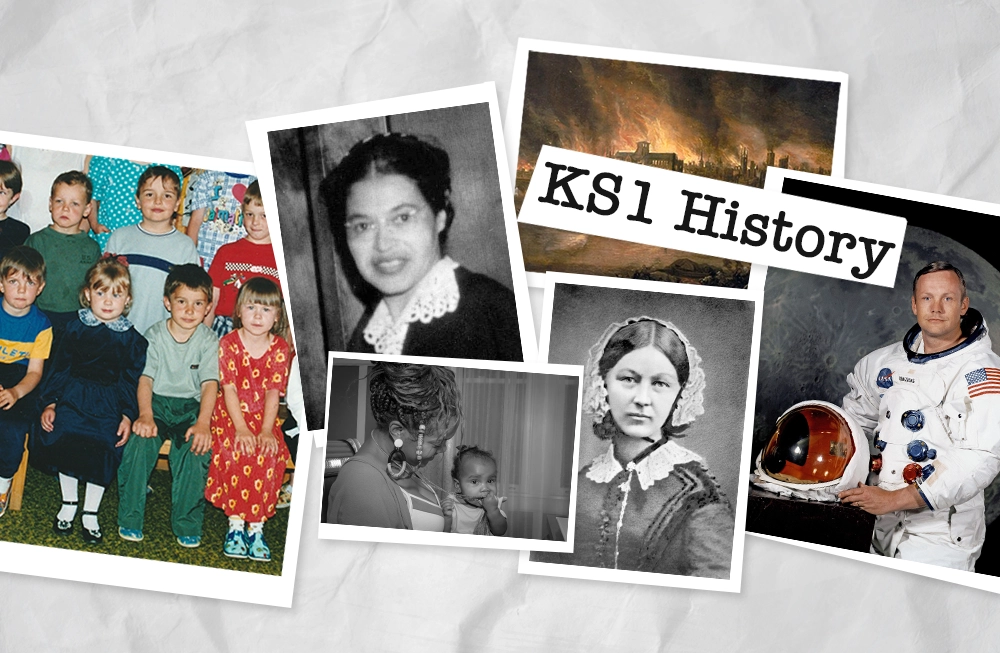Teaching history at Key Stage 1 (KS1) is all about sparking curiosity, building a sense of time and change, and helping young children begin to understand their place in the world. The KS1 History Curriculum in England provides a flexible but focused framework for achieving this – and it’s our job as teachers to bring it to life in engaging and meaningful ways.
Here’s a simple guide to what you need to cover, some tips on how to approach it in your classroom and the Cornerstones Curriculum projects that can help you cover each of the required programmes of study.
The Core Aims of KS1 History
According to the National Curriculum, by the end of KS1, children should be able to:
- Develop an awareness of the past, using common words and phrases relating to the passing of time.
- Know where the people and events they study fit within a chronological framework.
- Identify similarities and differences between ways of life in different periods.
- Use a wide vocabulary of everyday historical terms.
- Use a range of sources to find out about the past.
- Ask and answer questions about historical events and people.
The key goal is to build foundational historical thinking, not just facts – helping children to think like historians from the very beginning.
The Key Themes to Cover
1. Changes Within Living Memory
These are changes that have happened during the children’s own lives, or those of their parents and grandparents. This makes it relatable and tangible.
Examples might include:
- Changes in transport (e.g. cars, buses, trains)
- Changes in communication (from letters to smartphones)
- Changes in homes, toys, or schools over time
Tip: Ask children to interview older family members about their experiences growing up.
Cornerstones Curriculum projects that cover this programme of study:
- Childhood (Y1)
- Memory Box (Y1)
- School Days (Y1)
- Schools Then, Schools Now (Y1)
- Street Detectives (Y2)
- Flight through Time (Y2)
- Magnificent Monarchs (Y2)
- Movers and Shakers (Y2)
2. Events Beyond Living Memory
These are significant historical events that happened a long time ago but still have relevance today.
Examples might include:
- The Great Fire of London
- The first aeroplane flight
- The sinking of the Titanic
Tip: Use stories, role-play, and artefacts to help bring these events to life. Children love drama and dressing up!
Cornerstones Curriculum projects that cover this programme of study:
- Childhood (Y1)
- Dinosaur Planet (Y1)
- School Days (Y1)
- The Great Fire of London (Y1)
- Age of the Aztecs (Y2)
- Flight through Time (Y2)
- Magnificent Monarchs (Y2)
- Movers and Shakers (Y2)
- Titanic Tragedy (Y2)
3. The Lives of Significant Individuals
This involves studying the lives and achievements of notable men and women from the past who made a difference.
Suggested figures include:
- Florence Nightingale and Mary Seacole (nursing and medicine)
- Christopher Columbus and Neil Armstrong (exploration)
- Rosa Parks and Emily Davison (equality and rights)
- Kings and Queens like Queen Victoria or Elizabeth I
Tip: Compare two individuals – e.g., Nightingale and Seacole – to explore similarities and differences.
Cornerstones Curriculum projects that cover this programme of study:
- Dinosaur Planet (Y1)
- School Days (Y1)
- Schools Then, Schools Now (Y1)
- The Great Fire of London (Y1)
- Flight through Time (Y2)
- Magnificent Monarchs (Y2)
- Movers and Shakers (Y2)
4. Significant Historical Events, People and Places in Their Own Locality
Local history helps children connect to the past that’s all around them. This can be a wonderful opportunity to explore nearby landmarks, museums, or historical figures with local connections.
Tip: Find out what’s on your doorstep — it might be a castle, an old mill, a Roman road, or a historic building in your town or village.
Cornerstones Curriculum projects that cover this programme of study:
- Childhood (Y1)
- School Days (Y1)
- Schools Then, Schools Now (Y1)
- Movers and Shakers (Y2)
- Street Detectives (Y2)
How to Deliver the KS1 History Curriculum
You have the freedom to choose which topics and people to focus on, as long as your curriculum addresses all four of the required areas.
Ideas for Approaches:
- Thematic projects (e.g. “Heroes from History” or “Journeys and Exploration”)
- Cross-curricular links with English, Art, and Geography
- Hands-on learning with artefacts, timelines, and local trips
- Use of storybooks and visual media to support learning
Final Thoughts
The KS1 History curriculum is your chance to lay the groundwork for lifelong curiosity and historical thinking. It’s not about memorising dates – it’s about understanding people, change, and the world we live in today.
By choosing engaging topics, making connections to children’s lives, and encouraging inquiry and imagination, you’ll be helping your children develop not just knowledge, but a love of history.
The Cornerstones History Curriculum
Looking for inspiring lessons and resources to bring your Key Stage 1 history curriculum to life? The Cornerstones Curriculum offers everything you need with a carefully sequenced collection of projects designed by subject experts to support teachers at every level of subject knowledge.


